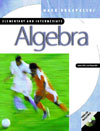| absolute value | The magnitude of a number; the undirected distance from the point named by the number to the origin on the number line. | -4 | = 4; | 3 | = 3.
|
 |
 |
 |
| additive identity | The number 0.
|
 |
 |
 |
| additive inverse | The opposite of a number.
|
 |
 |
 |
| algebraic expression | A meaningful combination of numbers and variables using the ordinary operations of arithmetic.
|
 |
 |
 |
| associative property of equality | When three or more numbers are added or multiplied, the operation can be performed in any order.
|
 |
 |
 |
| coefficient | A numeral or letter placed before an algebraic expression to indicate that the expression is to be multiplied by that factor.
In 3x, "3" is the coefficient of x.
|
 |
 |
 |
| commutative property of equality | The order in which two numbers are added or multiplied does not change the sum or product.
|
 |
 |
 |
| counting numbers | The numbers used for counting.
|
 |
 |
 |
| degree of a term | For a term with one variable, the degree is the value of the variable's exponent. For a term with two or more variables, the degree is the sum of the value of the exponents for all variables.
|
 |
 |
 |
| distributive property | Multiplication by a factor may be distributed over two or more addends.
|
 |
 |
 |
| equation | A mathematical statement that two expressions are equal.
|
 |
 |
 |
| equivalent equations | Equations that have the same solution.
|
 |
 |
 |
| exponent | A value that indicates the number of times a base is used as a factor.
|
 |
 |
 |
| integers | The set of positive and negative whole numbers including zero.
|
 |
 |
 |
| integral exponent | An exponent that is an integer.
|
 |
 |
 |
| irrational number | A number that cannot be expressed as a ratio of integers.
|
 |
 |
 |
| like terms | Terms that have the same variables with the same exponents.
|
 |
 |
 |
| multiplicative identity | The number 1.
|
 |
 |
 |
| natural numbers | The whole numbers used for counting, not including zero. {1, 2, 3...}
|
 |
 |
 |
| null set | The empty set (the set containing no elements).
|
 |
 |
 |
| order of operations | The order in which operations are to be performed in the absence of grouping symbols.
|
 |
 |
 |
| rational number | A number that can be expressed as a quotient of two integers.
|
 |
 |
 |
| real numbers | The set of numbers made up of rational and irrational numbers.
|
 |
 |
 |
| term | An expression containing a number or the product of a number and one or more variables.
|
 |
 |
 |
| variable | A letter that is used to represent some numbers.
|
 |
 |
 |
| whole numbers | The numbers in the set {0, 1, 2, 3,...}.
|



 2002 McGraw-Hill Higher Education
2002 McGraw-Hill Higher Education